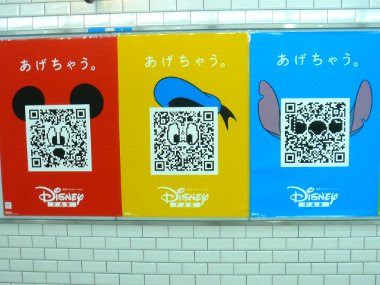Personally I got to know about QR-codes last year during AIESEC Global Communication Crew meeting, from Igor Rodrigues (If I don't mess anything). Now I see those QR-codes everywhere and personally use this simple method of coding and decoding, which, by the way, appeared in 1994 in Japan.
Small intro: QR-code is specific matrix two-dimensional barcode, readable with specific barcode readers and cameras of contemporary mobile phones. The information encoded can be URL or any other data.
Some month ago I used this "technology" to make a present for my friend, who got married. I made a t-shirt with "Just married" back and and encoded wishes for bride and groom in the front of t-shirts(1). They look very nice on this pic!
But now I discovered some more ways, how people use QR-codes and I also I find that it is a kind of fun to use them! And I think, that this info will be interesting for you too! Enjoy!
1) Postcards, t-shirts and other gifts with encoded secret message or wish
2) Discounts : you may scan the QR-code and receive a discount in some shop
3) Music/podcasts/video download links
5) Shorten URL : useful in advertising to attract people to use your web-page
6) Logo rebranding with encrypted URL or other info
7) Invite in Facebook or other social network
9) Tourism : Google map link. I heard this was used very well in Ukraine /Lviv. Imagine you are a tourist and you like a place you are visiting, but you don't understand Cyrillic alphabet, and you don't know what is this place. You can scan a barcode and got to know all needed touristic information about the place!
10) Tissot "Scan to Win" campaign : you can participate in lottery to win expensive Swiss watch. You scan, register and participate.
12) Japan visa
14) Good's barcode : everything you buy has a barcode. Some goods have QR-codes as a type of barcode.
15) Tatoos
16) Close/ accessories design
17) Building design+advertising
There is a futuristic design project in the UAE
18) Cemetery : the most inspiring way of using! Instead of writing the name of a relative or friend, Japanese people use QR-code, where they put all needed data about the dead person. Probably, that's very useful for cemetery administration and future generations.
19) Psychogeography : this was a movement appeared in mid-50s called 'Yellow Arrows', they marked spaces with yellow arrows, to show their attitude and it was a kind of fun. Everyone has his own idea about some sightseeing object, building or any place in a city. And everyone may write some message, opinion or story connected with that object and put QR-code label on it. Then, when you travel you may find this code and scan it with your mobile phone to know some new, may be tricky or funny facts about those place. It is like "AnnA was here".
20) Semapedia : is connected with psychogeorgaphy. You can create your own barcode and connect a place or any object with an article in wikipedia. It can be almost everything! When Berlin's municipality organized a psycho-geo-flash mob in the city, in the metro they promoted a web-page, where every user could choose an object and write his own idea about it, using a QR-code. You can connect virtual and physical world and www.semapedia.org by your own!
I found also some resources where you can create your own colorful QR-codes:
- http://mobile.kaywa.com/qr-code-data-matrix/index.html
- http://www.readwriteweb.com/archives/icandy_make_qr_codes_that_play_music.php
- http://en.semapedia.org/create/multiform/
- http://qrcode.es/?cat=20&language=en
- http://www.qrplanet.com/
- http://kazina.com/qr/index.html
- http://bloggertone.com/marketing/2011/01/05/qr-codes-will-they-be-big-in-2011/
- http://en.wikipedia.org/wiki/QR_Code
























